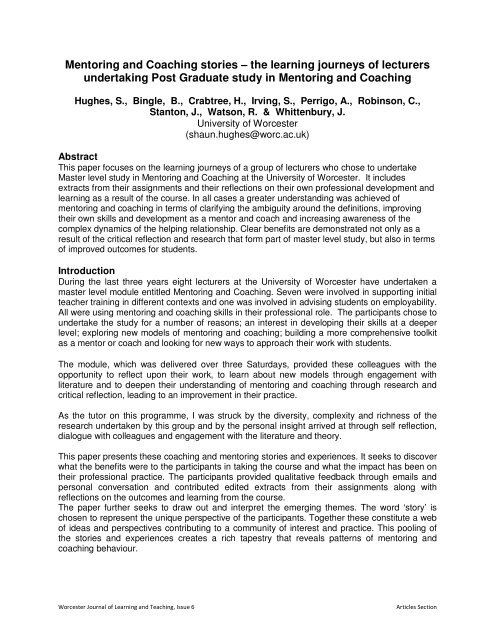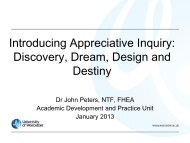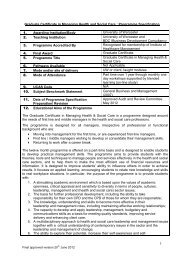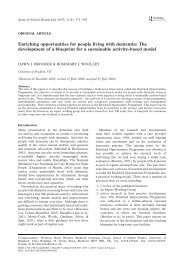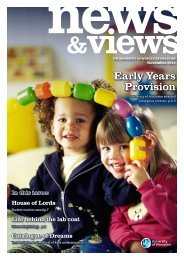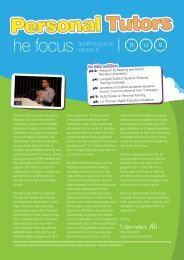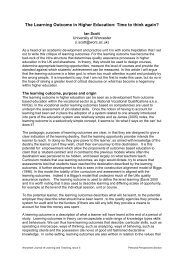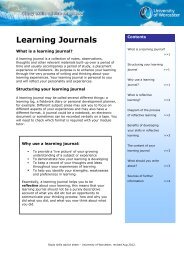Mentoring and Coaching stories - University of Worcester
Mentoring and Coaching stories - University of Worcester
Mentoring and Coaching stories - University of Worcester
Create successful ePaper yourself
Turn your PDF publications into a flip-book with our unique Google optimized e-Paper software.
the outcomes <strong>of</strong> the conversations. I have concluded that informal practices are neither equalnor greater to formal practices, but instead are different <strong>and</strong> as such play a valuable role withinthe formal pr<strong>of</strong>essional, reflective practices that are part <strong>of</strong> the trainees’ development. However,it seemed to me, an important aspect <strong>of</strong> mentoring is found in Whitmore’s claim that it is asmuch about the way these things are done as about what is done (Whitmore, 2001 p.6).The informal coaching <strong>and</strong> mentoring skills or techniques used by tutors role were relevant here<strong>and</strong> could range, according to Thomas <strong>and</strong> Smith’s perspective from directive to non-directive(2006, p.27). The unpredictable nature <strong>of</strong> the contents <strong>of</strong> an informal mentoring encounter addsa layer <strong>of</strong> complexity <strong>and</strong> requires great expertise on the part <strong>of</strong> tutors, when approached with aquick question. In a relatively short space <strong>of</strong> time the skill <strong>of</strong> switching <strong>and</strong> interweaving differentcoaching <strong>and</strong> mentoring techniques is required.<strong>Coaching</strong> - <strong>Mentoring</strong> <strong>and</strong> the GTP tutor: how far can I go?Heather Crabtree – Senior LecturerAs a GTP tutor I had previously encountered some difficulties in finding the best way to workwith some singularly dem<strong>and</strong>ing trainees so I was keen to adopt a different approach to mytutorial work. I wanted to explore whether if were more skilled in the art <strong>of</strong> coaching-mentoringthe time spent in tutorials could be more beneficial to the trainees.The scope <strong>of</strong> my research was very small <strong>and</strong> focused on critical reflections on my ownpractice. In order to identify the elements <strong>of</strong> mentoring-coaching, with the trainee’s permission, Irecorded two consecutive one-hour tutorials which occurred at the beginning <strong>and</strong> end <strong>of</strong> myinput sessions on the <strong>Coaching</strong> <strong>and</strong> <strong>Mentoring</strong> module.Part <strong>of</strong> my own ethical dilemma was the extent to which my carrying out this piece <strong>of</strong> researchwould impact on the level <strong>of</strong> support that I was able to <strong>of</strong>fer the trainee. Could participating inthis actually have a negative impact on him <strong>and</strong> hold him back? If my skills <strong>of</strong> coaching <strong>and</strong>mentoring were lacking then he may receive less support during tutorials than he otherwisewould have done. I was also struggling with my own concern, aware that I was considered byhim as the “expert”, what if by withholding useful advice I was actually making the course moredifficult for him? A leap <strong>of</strong> faith was needed that required me to be convinced that allowing thestudent to work out the solution for themselves (Malderez <strong>and</strong> Wedell 2007:126) would providea positive outcome.Analysis <strong>of</strong> the data coupled with emails <strong>and</strong> pr<strong>of</strong>essional conversations we subsequently hadleads me to conclude that this particular concern was unfounded as the trainee showed a goodlevel <strong>of</strong> reflection throughout the tutorials <strong>and</strong> more importantly appeared to feel empowered bythe outcomes <strong>of</strong> each tutorial.“…. Oh, that was great, I feel a lot better now”. (comment at the end <strong>of</strong> the secondtutorial)It became apparent that the nature <strong>of</strong> the questions I was asking required him to thinkcarefullyabout his own way <strong>of</strong> thinking <strong>and</strong> working:“That’s an interesting one! I’ll have a think about that.”“I think I have to! I’d not thought <strong>of</strong> it in that way”.However, a closer analysis <strong>of</strong> the conversations shows that these comments derived frommoments where as the mentor-coach, I veered more towards the directive <strong>and</strong> was <strong>of</strong>fering<strong>Worcester</strong> Journal <strong>of</strong> Learning <strong>and</strong> Teaching, Issue 6Articles Section
suggestions rather than waiting for him to come to his own conclusions. Although this does notnecessarily devalue the experience for the trainee, the underst<strong>and</strong>ing gained from thesequestions may have had more impact if it had been directly generated by the trainee himselfrather than intimated by the researcher.Heather’s focus was very much on the development <strong>of</strong> her interpersonal skills <strong>and</strong> practice. Sheacknowledges progress in her underst<strong>and</strong>ing <strong>and</strong> a growing interest in the relationship betweenmentoring <strong>and</strong> coaching, empowerment <strong>and</strong> fostering learning independence.I felt empowered by the fact that my instincts about my level <strong>of</strong> empathy had been vindicated,however, it was in listening where I felt that there was actual development in my practice overthe two tutorials. This was clear not only in the amount <strong>of</strong> time during which I spoke whichdecreased from the first tutorial to the second by approximately 10 minutes but also in the“deep listening” (Eldridge <strong>and</strong> Dembkowski, 2003) or what is referred to in the <strong>Mentoring</strong> <strong>and</strong><strong>Coaching</strong> Framework (2005) as “active listening”.I was actually in the moment, listening to what was being said <strong>and</strong> then responding to it, ratherthan listening <strong>and</strong> trying to work out where the speaker was going next or what my ownresponse to them might be.Finally, Turnbull (2009) suggests that if the coaching relationship is successful then inevitablythe coach themselves will notice an increase in their own awareness. I feel that the process <strong>of</strong>trying to identify myself as a mentor-coach has equipped me with skills which will serve me wellboth pr<strong>of</strong>essionally <strong>and</strong> personally <strong>and</strong> I can say without doubt that the journey thus far hasbeen very enlightening.Can a friend become a mentor? An investigation into the relationship betweenmentoring <strong>and</strong> friendship.Rose Watson – Employability Development OfficerCan a friend ever become a mentor? If so, how does mentoring in an informal context differfrom organisational mentoring? Can a formal mentoring relationship lead to an equalfriendship?Rose explores a number <strong>of</strong> definitions <strong>of</strong> friendship <strong>and</strong> compares these with widely agreeddefinitions <strong>of</strong> mentoring such as ‘a more experienced individual willing to share their knowledgewith someone less experienced in a relationship <strong>of</strong> mutual trust’ (Clutterbuck, 1994), or <strong>of</strong>coaching ‘...to create a psychological space...providing a supportive yet challenging relationship<strong>and</strong> dialogue’ (West <strong>and</strong> Milan, 2001)So what is the relationship between friendship <strong>and</strong> mentoring? Undoubtedly both involveelements <strong>of</strong> trust, support <strong>and</strong> respect, <strong>and</strong> Agnes Missirian (cited in Clutterbuck, 1994) arguesthat there is some recognition that the most successful mentoring relationships can <strong>of</strong>ten leadinto strong friendships. The idea <strong>of</strong> ‘mutual trust’ mentioned by Clutterbuck (ibid) appears to becrucial, with Pahl (2000) suggesting that the development <strong>of</strong> friendship involves a spirit <strong>of</strong>mutual awareness.Rose goes on to explore the crucial differences between mentoring <strong>and</strong> friendship <strong>and</strong> relatednotions such as critical friend <strong>and</strong> pr<strong>of</strong>essional friendship. After gaining feedback from mentees<strong>and</strong> drawing on a reflective journal some key themes <strong>and</strong> underst<strong>and</strong>ings emerge. All involvednotions <strong>of</strong> support, listening, <strong>and</strong> confidentiality.<strong>Worcester</strong> Journal <strong>of</strong> Learning <strong>and</strong> Teaching, Issue 6Articles Section
In addition, some people favoured the ‘expert’ approach, with ‘words <strong>of</strong> wisdom’ beingmentioned, whereas others suggested a personal development approach with reference to ‘thewhole person’ <strong>and</strong> ‘different perspectives’ This can be accounted for by differing underst<strong>and</strong>ings<strong>of</strong> the terms ‘coaching’ <strong>and</strong> ‘mentoring.’Underst<strong>and</strong>ings <strong>of</strong> friendship included mutual support, shared time, mutual underst<strong>and</strong>ing, <strong>and</strong>honesty <strong>and</strong> commitment.Most felt that the overlapping areas included support, respect <strong>and</strong> interaction. One personbrought up the notion <strong>of</strong> ‘critical friend’ in references to challenge, honesty <strong>and</strong> openness.Differences between the two roles included: power disparities, mutuality (mentoring generallyseen as one way), defined roles in the relationship, organisational restrictions <strong>and</strong> boundaries,<strong>and</strong> references to the degrees <strong>of</strong> choice in the two relationships.Concerns about whether a friend can become a mentor focused around the need for clearboundaries, notions <strong>of</strong> ‘critical friendship’ with some thinking they wouldn’t challenge a friend,<strong>and</strong> mutuality <strong>and</strong> shifts <strong>of</strong> power. The notion <strong>of</strong> prior knowledge was also raised, with thesuggestion that this have both a positive <strong>and</strong> negative impact on a mentoring relationship.It has become apparent throughout this study that people have differing concepts <strong>of</strong> mentoring<strong>and</strong> coaching. Where mentoring is seen as a relationship where an experienced member <strong>of</strong> staff<strong>of</strong>fers a junior or new one direction or support, there is likely to be an unequal powerrelationship <strong>and</strong> a lesser degree <strong>of</strong> mutuality. In this case, friendship may be less likely to existearlier on in the relationship, although it may emerge as the relationship matures. Having saidthis, a client-centred, developmental approach <strong>of</strong> coaching or co-coaching may well becongruent with the role <strong>of</strong> a critical friend. In this case the crucial element is the equal powerrelationship <strong>and</strong> the degree <strong>of</strong> mutuality, where friendship <strong>and</strong> mentoring/coaching may well becompatible. In either case, in order for the relationship to be successful, boundaries need to beagreed, either explicitly or tacitly, <strong>and</strong> rules may need to be renegotiated if the relationshipchanges over time.What makes an effective mentor or coach?Joy Stanton - Senior LecturerJoy’s interest was in finding out different perspectives on what makes an effective mentor <strong>and</strong>coach. This was the research area for her MA dissertation.My purpose was to try to discover more about what makes an effective mentor/coach for traineeteachers in a school setting. In order to do this I focused on both the teachers’ <strong>and</strong> students’view <strong>of</strong> the relationship: what they felt was successful in the relationship <strong>and</strong> what concernedthem.Initially, my research focused on mentors’ <strong>and</strong> students’ views <strong>of</strong> the special attributes <strong>of</strong> asuccessful mentor in school. There was a good deal <strong>of</strong> agreement about these from thestudents <strong>and</strong> mentors, with teachers <strong>and</strong> students valuing good inter-personal skills over <strong>and</strong>above what might be termed pr<strong>of</strong>essional or mentoring skills. Frequently mentioned were skills<strong>and</strong> qualities such as ‘open communication’, ‘listening’, ‘mutual trust’ <strong>and</strong> ‘supportive’. However,the students were also eager for ‘good feedback’ from their mentors <strong>and</strong> wanted their mentorsto be confident practitioners, this was something not mentioned by the teacher mentors. In order<strong>Worcester</strong> Journal <strong>of</strong> Learning <strong>and</strong> Teaching, Issue 6Articles Section
to underst<strong>and</strong> the mentoring/coaching relationship more, I turned my enquiry to find out aboutwhat activities mentors <strong>and</strong> students were engaging in to promote the pr<strong>of</strong>essional growth <strong>of</strong> thestudent. Interestingly, from my evidence there was a clear mis-match between what teachermentors said that they did with student teachers <strong>and</strong> the mentoring activities that the studentssaid they actually experienced. One explanation for this might be the tension between mentors’‘espoused theories’ <strong>and</strong> their ‘theories in use’ (Schon, 1983).<strong>University</strong> based teacher educators tend to be focused on developing the reflective practitioner<strong>and</strong> although teacher mentors <strong>and</strong> trainee teachers reported that critical reflection had beenencouraged through dialogue <strong>and</strong> questioning, the degree <strong>of</strong> reflection <strong>and</strong> whether it related tothe student teacher’s underlying values <strong>and</strong> beliefs about teaching <strong>and</strong> learning was uncertain.In fact, my own findings seemed to indicate that both teacher mentors <strong>and</strong> student teacherstended to hold a ‘theory into practice’ (where what was learned in university was then tried outon school experience) <strong>and</strong> a ‘trial <strong>and</strong> error’ approach to pr<strong>of</strong>essional learning on schoolexperience which may or may not have allowed for any in-depth reflection on the students’underlying values <strong>and</strong> beliefs.This research has suggested important avenues for further development at the heart <strong>of</strong> which isa consideration <strong>of</strong> the special attributes knowledge <strong>and</strong> circumstances that might lead to a moreeffective mentoring relationship between mentors <strong>and</strong> student teachers.The Returner’s StoryAlan Perrigo – Senior lecturerAlan leads the Returner course for teachers <strong>and</strong> describes the strategies used to address theneeds <strong>of</strong> local teachers wishing to return to the classroom. He identifies a lack <strong>of</strong> confidence<strong>and</strong> a need to refresh knowledge <strong>and</strong> underst<strong>and</strong>ing. Alan goes on to suggest that mentoring<strong>and</strong> coaching provides a vital link with positive reflective practice,‘I thought once a teacher always a teacher. There is always that wee bit in you that lingers on. Ifyou enjoy teaching, it will always be there’ Robinson et al (1992). This reference taken fromresearch carried out by the Scottish Council for Research in 1992 reflects the essence as towhy teachers want to return to the pr<strong>of</strong>ession. They have enjoyed past successes <strong>and</strong> now feelit is time to start again. This story is about how a Return to Teaching course can provide theplatform for teachers who want to renew their skills <strong>and</strong> update their pedagogy <strong>and</strong> knowledgein the Primary field. My story is about how this success can be gained by the impact <strong>of</strong> goodmentoring support in order for these returning teachers to achieve their goals.Throughout this journey there needs to be a strong sense <strong>of</strong> self belief <strong>and</strong> efficacy, as goalscan be realistically achieved. Forde et al (2006 p16), refer to feelings <strong>of</strong> self- efficacy <strong>and</strong>suggest that it is ‘the extent to which we believe that we have the capacity to achieve what wethink <strong>of</strong> as desirable outcomes’. They also support these feelings within the individual, byconsidering the need to set goals, think strategically, optimistically <strong>and</strong> persevere in anychallenge set for them. Therefore, the key aims <strong>of</strong> this course are to refresh teacher’s skills in aclassroom environment <strong>and</strong> extend their pr<strong>of</strong>essional knowledge <strong>and</strong> competences. Againadded to this is the importance <strong>of</strong> building an individual’ sense <strong>of</strong> purpose <strong>and</strong> self worth, inknowing that they can achieve success by embarking on the journey <strong>of</strong> self discovery <strong>and</strong>development.Returners also need to feel empowered <strong>and</strong> challenged, Page <strong>and</strong> Czuba (1999) defineempowerment as ‘a process that challenges our assumptions about the way things are <strong>and</strong> can<strong>Worcester</strong> Journal <strong>of</strong> Learning <strong>and</strong> Teaching, Issue 6Articles Section
e’. They add to their definition that it is about ‘change’ <strong>and</strong> that if this happens thenempowerment can be a meaningful concept. I see my role on this journey as being the ‘catalyst’to enable the individual to work through this ‘process <strong>of</strong> change’. It is about ‘supportivementoring’, which is a vital element <strong>of</strong> pr<strong>of</strong>essional development. ‘ <strong>Mentoring</strong> helps peopleunderst<strong>and</strong> <strong>and</strong> work through change <strong>and</strong> so contributes to the achievement <strong>of</strong> the Mission orStrategy ’(Alred et al ,1998).This is also supported by The National Framework for <strong>Mentoring</strong> <strong>and</strong> <strong>Coaching</strong> (CUREE,2005)in stating that ‘mentoring is a structured process to support pr<strong>of</strong>essional learners throughsignificant career changes’. The returner’s journey is one <strong>of</strong> self discovery <strong>and</strong> in the belief thatthey can make changes in their own pr<strong>of</strong>essional development <strong>and</strong> practice.Concluding thoughtsThese brief extracts indicate the complexity <strong>and</strong> richness <strong>of</strong> the detailed research <strong>and</strong> reflectionin the assignments. The participants have all achieved their aims stated at the start <strong>of</strong> thecourse <strong>and</strong> have learnt a great deal which will inform <strong>and</strong> improve their work as mentors <strong>and</strong>coaches. For some this has been about gaining a greater clarity in their role <strong>and</strong> an increasedconfidence in using mentoring <strong>and</strong> coaching skills, such as choosing directive or non-directivehelping behaviours. This has led to increased confidence in underst<strong>and</strong>ing the dynamics <strong>of</strong> thementoring <strong>and</strong> coaching relationship. For others it has resulted in establishing new approaches<strong>and</strong> practical strategies such as enhanced training for school based mentors which will make apositive difference. For some the outcomes were unexpected, ‘Curiously, I feel that, at themoment, the biggest impact has been in my personal life where I have really been much morecautious in giving out advice.’The group identified a number <strong>of</strong> key learning moments during the course. These centeredaround the basic skills <strong>of</strong> mentoring <strong>and</strong> coaching; listening for meaning, questioning forunderst<strong>and</strong>ing <strong>and</strong> holding back wisdom for the benefit <strong>of</strong> others. Further, they were asked toreflect on their learning from the course <strong>and</strong> their thoughts are included below:This module has really helped me to think about both my pr<strong>of</strong>essional relationships, <strong>and</strong> alsothe nature <strong>of</strong> the ‘helping’ <strong>and</strong> ‘critical’ friendships in my wider life. By underst<strong>and</strong>ing further thecontext <strong>of</strong> helping relationships, <strong>and</strong> the impact <strong>of</strong> power disparities, mutuality <strong>and</strong> boundaries, Ihope to be able to forge more effective relationships to help colleagues <strong>and</strong> students learn <strong>and</strong>develop.Discussions with my mentee about her agenda made me consider my own academic practice<strong>and</strong> gave me the confidence to take risks. I was at a stage where I needed to grow in my ownconfidence <strong>and</strong> mentoring provided me with a vehicle for doing that. I also needed anintellectual push, making me reflect on what I did <strong>and</strong> how I would work differently with mystudents <strong>and</strong> my next mentee.Since undertaking the PG Cert in <strong>Mentoring</strong> <strong>and</strong> <strong>Coaching</strong> my practice has changed in manyways but I have been mostly influenced in terms <strong>of</strong> leadership <strong>and</strong> course design. I have helpedfacilitate enhanced mentoring <strong>and</strong> coaching by providing school-based trainers with appropriatetraining thus <strong>of</strong>fering GTP trainees an improved training experience. This has resulted in moretrainees attaining grade 1 'outst<strong>and</strong>ing' by the end <strong>of</strong> their GTP year, a significant indicator <strong>of</strong>the impact that enhanced mentoring training may have had.<strong>Worcester</strong> Journal <strong>of</strong> Learning <strong>and</strong> Teaching, Issue 6Articles Section
Carrying out a small-scale research project into the nature <strong>of</strong> informal coaching <strong>and</strong> mentoringpractices, led me to value <strong>and</strong> respect the importance <strong>of</strong> these practices for trainees, as well asan underst<strong>and</strong>ing <strong>of</strong> the high level <strong>of</strong> skill required by tutors on daily basis.As a result <strong>of</strong> undertaking the <strong>Mentoring</strong> <strong>and</strong> <strong>Coaching</strong> module I identified key points which Iwished to inform future practice. I felt it was important to agree an outcome for the meeting witha mentee at the beginning <strong>of</strong> the tutorial to provide a focus for discussion, <strong>and</strong> I haveimplemented this strategy, although I have found that by asking questions regarding thepurpose for setting up a tutorial prior to actually meeting it allows me to prepare better for afocused discussion.From my view as the tutor on this course it has been interesting <strong>and</strong> very rewarding to work withcolleagues. There has been a deep engagement with the issues around mentoring <strong>and</strong>coaching <strong>and</strong> ongoing research <strong>and</strong> development in this area. The participants have operated atthe ‘forefront <strong>of</strong> pr<strong>of</strong>essional practice’ <strong>and</strong> there has been a strong relationship between theory<strong>and</strong> practice.Three key themes have emerged from the assignments <strong>and</strong> student reflections. These helpclarify important elements that have arisen from the course <strong>and</strong> from the student’s research.The first concerns role conception - there is a need to continually reflect on the relationshipbetween the mentor <strong>and</strong> coach <strong>and</strong> the mentee, coachee. Discussion <strong>of</strong> the terminologysurrounding mentoring <strong>and</strong> coaching is more than semantics, it provides a necessary <strong>and</strong>illuminating critique <strong>of</strong> the activities. It helps move beyond an adherence to one position oranother, to recognition <strong>of</strong> the complex, dynamic inter-relationships involved in one personhelping another. Clutterbuck uses the term developmental space which is helpful for both thementor <strong>and</strong> mentee (2004). Key words used in all assignments were; partnership, collaboration,uniqueness, trust, empowerment, respect, friendship, enabling <strong>and</strong> relationship. The effectivementor works to establish <strong>and</strong> develop all <strong>of</strong> these.Clutterbuck <strong>and</strong> Wynne (1994) suggest mentor, coach, counselor, networker <strong>and</strong> facilitator in asimilar mode as role descriptors. There is a growing recognition that the mentor can undertakeall <strong>of</strong> these roles. Thomas (2004) refers to this as a triangle <strong>of</strong> support involving coaching,mentoring <strong>and</strong> counseling, all needed at different times.The second theme is that <strong>of</strong> communication. Underst<strong>and</strong>ing the ‘mental model’ <strong>of</strong> the mentee bythe mentor is an important first step in supporting learning (Senge, 1999) The key skills <strong>of</strong>building rapport, listening <strong>and</strong> questioning <strong>and</strong> moving on, as well as providing feedback,emerge as areas for ongoing research (Creasy&Patterson, 2005). The skills are used to enablethe mentee to gain awareness <strong>and</strong> underst<strong>and</strong>ing <strong>and</strong> importantly, as Whitmore suggests(2002) take responsibility.Finally all participants in the mentoring <strong>and</strong> coaching activity can be empowered throughsuccessful helping relationships. This leads to an increase in self confidence <strong>and</strong> self – efficacy.It encourages high levels <strong>of</strong> intent <strong>and</strong> a belief in the ‘capacity to achieve a desired outcome’(B<strong>and</strong>ura, 1998) The assignments demonstrate that mentoring <strong>and</strong> coaching developsemotional intelligence, personal growth <strong>and</strong> critical thinking. Saying the right thing at the righttime as well as asking difficult questions <strong>and</strong> providing challenge is a potent combination.The contributors to this paper have gone on to develop <strong>and</strong> deepen their expertise as a mentors<strong>and</strong> coaches. A number <strong>of</strong> the group continued with their study to a Post Graduate Certificate in<strong>Mentoring</strong> <strong>and</strong> <strong>Coaching</strong> <strong>and</strong> some have focused on this area in the dissertation work.<strong>Worcester</strong> Journal <strong>of</strong> Learning <strong>and</strong> Teaching, Issue 6Articles Section
They are part <strong>of</strong> a developing community <strong>of</strong> learners who are inspired <strong>and</strong> are inspiring othersthrough mentoring, coaching, tutoring <strong>and</strong> helping, which is proving so <strong>of</strong>ten, to betransformational for pr<strong>of</strong>essional learning.A new group <strong>of</strong> colleagues have started the PGC in <strong>Mentoring</strong> <strong>and</strong> <strong>Coaching</strong> this term(Summer 2011) There is therefore much potential for future collaborative research.Please contact the authors for a full transcript <strong>of</strong> the assignments quoted here.ReferencesAldred, G., Garvey, G. <strong>and</strong> Smith, R. (1998) The <strong>Mentoring</strong> Pocket Book,Management Pocket Books.London:B<strong>and</strong>ura, A. (1998) Self- efficacy: The Exercise <strong>of</strong> Control, New York: W. H. Freeman <strong>and</strong>Company.Bell, J. (2003) Doing Your Research Project, (3 rd ed). Buckingham: Open <strong>University</strong> Press.Brooks, V. & Sikes, P. (1997) The Good Mentor Guide. Buckingham: Open <strong>University</strong> Press.Clutterbuck, D. (2001) Everyone Needs a Mentor. London: CIPD.Clutterbuck, D. (2004) Everyone Needs a Mentor (4 th ed). London: CIPD.CfBT (2010) <strong>Coaching</strong> for Teaching <strong>and</strong> Learning, Guidance Report. National College.Clutterbuck, D. <strong>and</strong> Wynne, B. (1994) <strong>Mentoring</strong> <strong>and</strong> <strong>Coaching</strong> in Mumford, A (ed.) GowerH<strong>and</strong>book <strong>of</strong> Management Development (4 th Ed), Aldershot: GowerClutterbuck, D. (2007) <strong>Coaching</strong> the Team at Work. London: Nicholas Brealey International.Creasy, J <strong>and</strong> Paterson, F. (2005) Leading <strong>Coaching</strong> in Schools. Nottingham: National College<strong>of</strong> School Leadership.CUREE (2005) National Framework for <strong>Mentoring</strong> <strong>and</strong> <strong>Coaching</strong>. London: DCSFDowney, M. (1999) Effective <strong>Coaching</strong>. London: Orion Business Books.DfE (2010) The Case for Change. http:/www.dfe.gov.ukEldridge, F., <strong>and</strong> Dembkowski, S. (2003) The Achieve <strong>Coaching</strong> Model Accessed on17/02/2010 at www.coachingnetwork.org.uk/resourcecentre/Articles/pdfs/CtC3.pdfFlaherty, J. (1998) <strong>Coaching</strong>; Evoking Excellence in Others. Boston: Butterworth-Heinemann.Forde, C., McMahon, M., McPhee A.D <strong>and</strong> Patrick, F. (2006) Pr<strong>of</strong>essional Development,Reflection <strong>and</strong> Enquiry, London: Paul Chapman Publishing Ltd.Furlong, J. <strong>and</strong> Maynard, T. (1995) <strong>Mentoring</strong> Student Teachers: the growth <strong>of</strong> pr<strong>of</strong>essionalknowledge. London: Routledge.<strong>Worcester</strong> Journal <strong>of</strong> Learning <strong>and</strong> Teaching, Issue 6Articles Section
Furlong, J., Maynard, T., Miles, S. & Wilkin, M (1997) The Principles <strong>and</strong> Processes <strong>of</strong> <strong>Mentoring</strong> in Maynard, T.(ed.) An Introduction to Primary <strong>Mentoring</strong> . London: Cassell.Furlong, J., Barton, L., Miles, S, Whiting, C. & Whitty, G. (2000) Teacher Education in Transition– Reforming Pr<strong>of</strong>essionalism? Buckingham: Open <strong>University</strong> Press.Kolb, D.A (1985) Experiential Learning: Experience as the sources <strong>of</strong> learning <strong>and</strong>development, Englewood Cliffs, NJ: Prentice Hall.Leslie, K. Lingard, L. Whyte, S. (2005) Junior faculty experiences with informal mentoring.Medical Teacher, 27(8), pp. 693-698.L<strong>of</strong>thouse,R., Leat, D., Towler,C. (2010) <strong>Coaching</strong> for Teaching <strong>and</strong> Learning: a practical guidefor schools. CfBTMalderez, A. <strong>and</strong> Wedell, M. (2007) Teaching Teachers: Processes <strong>and</strong> Practices. London:ContinuumMaslow, A. (1954) Motivation <strong>and</strong> Personality. New York: Harper <strong>and</strong> Row.Megginson, D <strong>and</strong> Clutterbuck, D. (2005) Techniques for <strong>Coaching</strong> <strong>and</strong> <strong>Mentoring</strong>. Oxford:Elsevier Butterworth-HeinemannMcIntyre, D. & Hagger, H. (eds) (1996) Mentors in Schools – Developing the Pr<strong>of</strong>ession <strong>of</strong>Teaching. London: David Fulton.McIntyre, D., Hagger, H., & Wilkin, M. (1993) <strong>Mentoring</strong>: Perspectives on School-based TeacherEducation. London: Kogan Page.Osterman, K . <strong>and</strong> Kottkamp, R. (1993) Reflective Practice for Educators. California USA:Corwin Press Inc.Page, N. <strong>and</strong> Czuba, C. (1999) Empowerment What Is It? Journal <strong>of</strong> Extension. Vol.37 No.5.Pask, R. <strong>and</strong> Joy, B. (2007) <strong>Mentoring</strong>-<strong>Coaching</strong>: A Guide for Education Pr<strong>of</strong>essors.Maidenhead: OUP.Pahl, R. (2000), On Friendship. Cambridge: Polity.Pask, R. <strong>and</strong> Joy, B. (2007) <strong>Mentoring</strong>-<strong>Coaching</strong>: A Guide for Education Pr<strong>of</strong>essors.Maidenhead: OUP.Robinson R, Munn, P <strong>and</strong> Macdonald, C. (1992) Once a Teacher Always a Teacher? ScottishCouncil for Research in Education.Schon, D. (1983) The Reflective Practitioner: How pr<strong>of</strong>essionals think in action. London: TempleSmith.Senge, P. (1990) The Fifth Discipline: The Art <strong>and</strong> Practice <strong>of</strong> the Learning Organization,London: Doubleday.<strong>Worcester</strong> Journal <strong>of</strong> Learning <strong>and</strong> Teaching, Issue 6Articles Section
Thomas, W. <strong>and</strong> Smith, A. (2006) <strong>Coaching</strong> Solutions. Australia: Hawker Brownlow.Thomas, W. <strong>and</strong> Smith, A. (2004) <strong>Coaching</strong> Solution. Stafford: Network Educational Press ltd.Tomlinson, P. (1995) Underst<strong>and</strong>ing <strong>Mentoring</strong>. Buckingham: Open <strong>University</strong> Press.Turnbull, J. (2009) <strong>Coaching</strong> for learning: a practical guide for encouraging learning. London:Continuum.West, L. And Milan, M. (2001) The Reflective glass: Pr<strong>of</strong>essional coaching for leadershipdevelopment’ cited in Bush, T <strong>and</strong> Middlewood, D. (2005) ‘Leading <strong>and</strong> Managing People inEducation. London: Sage Publications.Whitmore, J. (2001) <strong>Coaching</strong> for Performance. London: Nicholas Brealey Ltd.Whitmore. J. (2002) 3 rd ed. <strong>Coaching</strong> for Performance: Growing People, Performance <strong>and</strong>Purpose. London: Nicholas Brealey Publishing Ltd.Zeus, P. <strong>and</strong> Skiffington, S. (2000) The Complete Guide to <strong>Coaching</strong> at Work. Sydney: McGrawHill.<strong>Worcester</strong> Journal <strong>of</strong> Learning <strong>and</strong> Teaching, Issue 6Articles Section


